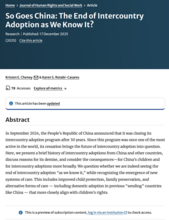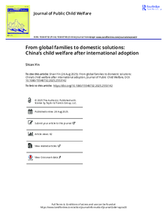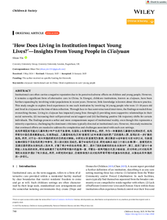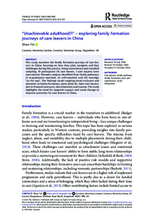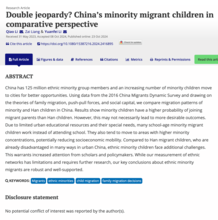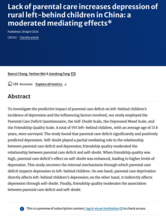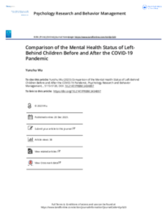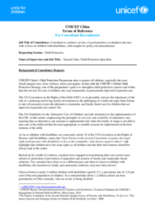Displaying 1 - 10 of 195
This article presents a brief history of intercountry adoptions from China and other countries, discusses reasons for its demise, and considers the consequences—for China’s children and for intercountry adoptions more broadly. It questions whether we are indeed seeing the end of intercountry adoption “as we know it,” while recognizing the emergence of new systems of care.
This article explores China’s Child Directors System, a nationwide initiative that appoints trained community members to safeguard vulnerable children and connect them with essential services. It highlights the system’s strengths—such as early intervention, broad coverage, and multi-sector collaboration—while noting its potential as a model for other countries.
China’s decision to end its international adoption program after 30 years affects over 160,000 children, many with disabilities, raising concerns about increased institutionalization and developmental risks. This commentary highlights the need for reforms such as expanding domestic adoption, improving foster and kinship care, enhancing institutional quality, and strengthening cross-sector collaboration to create a more family-centered child welfare system.
This study explored the experiences of 14 adolescents living in a ci'aiyuan childcare institution in Xiangxi, China, finding that it sometimes fostered supportive relationships, enhanced perceived social support, and facilitated positive life changes. While these accounts challenge dominant negative views of institutional care, the study emphasizes the need to address ongoing complexities and challenges in such settings.
This study examines the family formation journeys of care leavers in China, focusing on how they plan, navigate, and face challenges during this process.
Using data from the 2016 China Migrants Dynamic Survey and drawing on the theories of family migration, push-pull forces, and social capital, the authors compare migration patterns of minority and Han children in China. Results show minority children have a higher probability of joining migrant parents than Han children. However, this may not necessarily lead to more desirable outcomes.
The Chinese government is ending its intercountry adoption program, and the U.S. is seeking clarification on how the decision will affect hundreds of American families with pending applications.
This study uncovers the internal mechanisms through which parental care deficit impacts depression in left-behind children in China.
To investigate and discuss the mental health status of left-behind children in Anhui Province before and after the COVID-19 pandemic and analyze its influencing factors.
- Job no: 566777
- Contract type: Consultant
- Duty Station: Beijing
- Level: Consultancy
- Location: China

